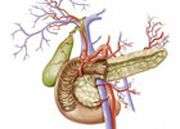Pancreas, pancreatic duct and vessels. Credit: Medical Art Service, Munich, Wellcome Images
(PhysOrg.com) -- An international consortium of scientists has identified 12 new genes associated with type 2 diabetes, in the largest study of the genetics of the condition to date.
The consortium of researchers - from across the UK, Europe, the USA and Canada - compared the DNA of over 8000 people with type 2 diabetes with that of almost 40 000 people without the condition at 2.5 million locations across the genome. They then checked the genetic variations they found in another group of over 34 000 people with diabetes and almost 60 000 controls.
The findings, reported in the journal 'Nature Genetics', bring the total number of genetic regions known to be associated with type 2 diabetes to 38.
"The signals we have identified provide important clues to the biological basis of type 2 diabetes," says Professor Mark McCarthy from the Wellcome Trust Centre for Human Genetics at the University of Oxford, who led the consortium. "The challenge will be to turn these genetic findings into better ways of treating and preventing the condition."
Some of the genes identified in this study are involved in beta cells, which are found in the pancreas and produce insulin. In type 2 diabetes, the body does not respond to insulin as it should.
"One important theme is that several of the genes seem to be important in controlling the number of pancreatic beta cells that an individual has," says Professor McCarthy. "This helps settle a long-standing controversy about the role of beta-cell numbers in type 2 diabetes risk, and points to the importance of developing therapies that are able to preserve or restore depleted numbers of beta cells."
The individual effects of the 12 genetic regions identified in this work are small. Indeed, even in combination, their capacity to predict a person's future risk of diabetes is modest. However, these findings could ultimately have a substantial impact on our understanding of the biology of diabetes, and the development of therapies.
The researchers are now planning to use whole-genome sequencing to try to identify further variations in DNA sequence that are linked to the condition.
More information: Voight B et al. Twelve type 2 diabetes susceptibility loci identified through large-scale association analysis. Nat Genet 2010.
Provided by Wellcome Trust


















